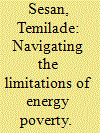| Srl | Item |
| 1 |
ID:
110695


|
|
|
|
|
| Publication |
2011.
|
| Summary/Abstract |
Burning of biomass for cooking is associated with health problems and climate change impacts. Many previous efforts to disseminate improved stoves - primarily by governments and NGOs - have not been successful. Based on interviews with 12 organizations selling improved biomass stoves, we assess the results to date and future prospects of commercial stove operations in India. Specifically, we consider how the ability of these businesses to achieve scale and become self-sustaining has been influenced by six elements of their respective business models: design, customers targeted, financing, marketing, channel strategy, and organizational characteristics. The two companies with the most stoves in the field shared in common generous enterprise financing, a sophisticated approach to developing a sales channel, and many person-years of management experience in marketing and operations. And yet the financial sustainability of improved stove sales to households remains far from assured. The only company in our sample with demonstrated profitability is a family-owned business selling to commercial rather than household customers. The stove sales leader is itself now turning to the commercial segment to maintain flagging cash flow, casting doubt on the likelihood of large positive impacts on health from sales to households in the near term.
|
|
|
|
|
|
|
|
|
|
|
|
|
|
|
|
| 2 |
ID:
114305


|
|
|
|
|
| Publication |
2012.
|
| Summary/Abstract |
Energy poverty has been defined as the lack of access of households in developing countries to modern energy sources, and their consequent reliance on solid biomass fuels for cooking. Improved stoves have been promoted by development actors since the 1970s to alleviate various environmental and health problems associated with biomass use, with largely disappointing outcomes. Against this background, this paper examines the intervention of an international development organisation - Practical Action - in West Kochieng, Kenya, where the organisation's energy poverty alleviation efforts are aimed at addressing the health hazards of biomass smoke with six 'low-cost' improved cooking technologies. The study reveals that the cooking technology most valued by poor West Kochieng households is the one which most reflects their priorities, rather than those expressed by Practical Action. The findings point to three aspects of appropriateness of energy poverty alleviation interventions - technological, economic and cultural - which combine to influence acceptance and uptake of such interventions. The evidence highlights some of the limitations inherent in the generic policy recommendation to 'leapfrog' towards the resolution of energy poverty-related problems, and suggests that more measured steps which respond to the socio-economic realities of poor households are likely to engender more appropriate solutions.
|
|
|
|
|
|
|
|
|
|
|
|
|
|
|
|